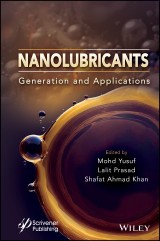Details

Nanolubricants
Generation and Applications1. Aufl.
|
168,99 € |
|
| Verlag: | Wiley |
| Format: | EPUB |
| Veröffentl.: | 10.04.2024 |
| ISBN/EAN: | 9781119865674 |
| Sprache: | englisch |
| Anzahl Seiten: | 288 |
DRM-geschütztes eBook, Sie benötigen z.B. Adobe Digital Editions und eine Adobe ID zum Lesen.
Beschreibungen
<b>NANOLUBRICANTS</b> <p><b>Through the dissemination of the latest advancements in nanolubrication science, this volume addresses the pressing concerns surrounding their economic feasibility, environmental acceptability, sustainability, and overall viability.</b> <p>Lubrication is the lifeblood of machinery and the key to its smooth operation. In the world of mechanics and engineering, the role of lubricants cannot be overstated. They are the unsung heroes that reduce friction between surfaces in contact, thus preventing excessive heat generation during motion. Beyond this primary function, lubricants find their application in diverse areas, including power transmission, foreign object transportation, and the regulation of surface temperature. <p>In recent times, the world has shifted towards sustainable and environmentally-friendly practices, prompting a transition from conventional lubricants to more efficient and eco-conscious alternatives. Among these emerging solutions, nanolubricants have emerged as formidable contenders, reshaping the landscape of lubrication technology. Their adoption not only promises enhanced performance but also carries the added benefit of environmental responsibility through biodegradability. <p>This book delves into the multifaceted realm of nanolubricants, exploring their characterization and application across various domains. From vegetable oil-based lubricants to those incorporating metal and non-metal oxide components, this comprehensive work encompasses nine meticulously curated chapters. <p>A particular focus is placed on the intriguing synergy between nano-dimensionality and the incorporation of metals and metal oxides into vegetable oil-based biodegradable lubricants. The book explores the environmental advantages, progress, and challenges associated with this innovative approach. Furthermore, it delves into the integration of functionalized nanostructured semi-metal-based compounds as lubricant additives in non-edible vegetable oils, paving the way for improved tribological properties. <p><b>Audience</b> <p>The book is extremely important to industrial practitioners working in mechanical engineering, tribology, wear, tear, friction and lubrication behavior of machinery. Researchers in nanoscience, nanotechnology, materials science, and sustainability subjects, will find this book useful.
<p><b>Mohd Yusuf, PhD, </b>is a dean and associate professor in the School of Life & Natural Sciences at the Glocal University in Saharanpur, India. He earned a PhD in nature-derived products and their applications in 2013. His research focuses on green and sustainable materials, functional biomaterials, biocolorants, and energy storage technology. He has more than 60 publications in applied sciences and sustainable materials. <p><b>Lalit Prasad, PhD,</b> is a professor of basic sciences at Galgotias University in Greater Noida, India. He earned a PhD from the Indian Institute of Technology Delhi in New Delhi, India. He has contributed 26 research articles to peer-reviewed journals, several book chapters and has conducted international projects. His research interests are in organic applied chemistry, interdisciplinary science, nanotechnology, and renewable biofuels. <p><b>Shafat Ahmad Khan, PhD, </b>is an associate professor at Galgotias University in Greater Noida, India. He holds a PhD in organic chemistry from Jamia Millia Islamia, New Delhi. His research focuses on natural product chemistry, colorant thermodynamics and kinetics, UV-blocking, and antibacterial textile finishing. He has also written numerous research papers for international and national scientific bodies.
<p><b>Through the dissemination of the latest advancements in nanolubrication science, this volume addresses the pressing concerns surrounding their economic feasibility, environmental acceptability, sustainability, and overall viability.</b> <p>Lubrication is the lifeblood of machinery and the key to its smooth operation. In the world of mechanics and engineering, the role of lubricants cannot be overstated. They are the unsung heroes that reduce friction between surfaces in contact, thus preventing excessive heat generation during motion. Beyond this primary function, lubricants find their application in diverse areas, including power transmission, foreign object transportation, and the regulation of surface temperature. <p>In recent times, the world has shifted towards sustainable and environmentally-friendly practices, prompting a transition from conventional lubricants to more efficient and eco-conscious alternatives. Among these emerging solutions, nanolubricants have emerged as formidable contenders, reshaping the landscape of lubrication technology. Their adoption not only promises enhanced performance but also carries the added benefit of environmental responsibility through biodegradability. <p>This book delves into the multifaceted realm of nanolubricants, exploring their characterization and application across various domains. From vegetable oil-based lubricants to those incorporating metal and non-metal oxide components, this comprehensive work encompasses nine meticulously curated chapters. <p>A particular focus is placed on the intriguing synergy between nano-dimensionality and the incorporation of metals and metal oxides into vegetable oil-based biodegradable lubricants. The book explores the environmental advantages, progress, and challenges associated with this innovative approach. Furthermore, it delves into the integration of functionalized nanostructured semi-metal-based compounds as lubricant additives in non-edible vegetable oils, paving the way for improved tribological properties. <p><b>Audience</b> <p>The book is extremely important to industrial practitioners working in mechanical engineering, tribology, wear, tear, friction and lubrication behavior of machinery. Researchers in nanoscience, nanotechnology, materials science, and sustainability subjects, will find this book useful.

















